Considering the global trend towards sustainable development, and the endeavor of Arab countries and governments towards implementing the United Nations 2030 Agenda, the Economic and Social Council issued Resolution No. 2134 in its 99th regular session, deeming the 16th of February of each year an Arab day for sustainability.
On the sidelines of the day's celebrations, Maat for Peace, Development and Human Rights is launching an online campaign, under the title "Sustainable Arab World" in order to highlight the role of Arab countries in achieving the goals of sustainable development, and to raise awareness of the importance of the necessary measures for the goals of concern for the year 2023.
This campaign highlights five Sustainable Development Goals: Goal 6 (Access to clean water and sanitation), Goal 7 (Access to clean and affordable energy), Goal 9 (Industry, innovation and infrastructure), Goal 11 (Building sustainable cities and communities) and Goal 17 (Building partnerships In order to achieve the goals); the goals subject to review at the High Level Political Forum in July 2023.
#Arab_Sustainability _Day
#16_February
#Sustainable_Arab_World
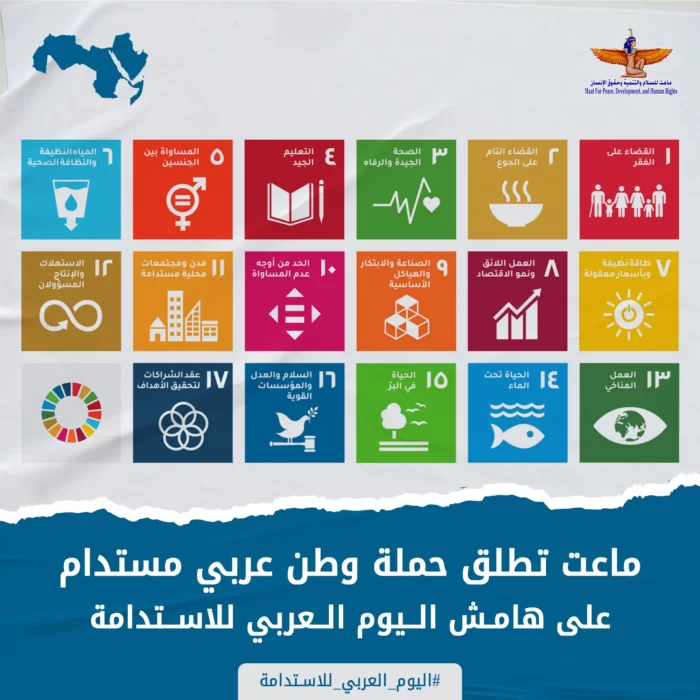 |
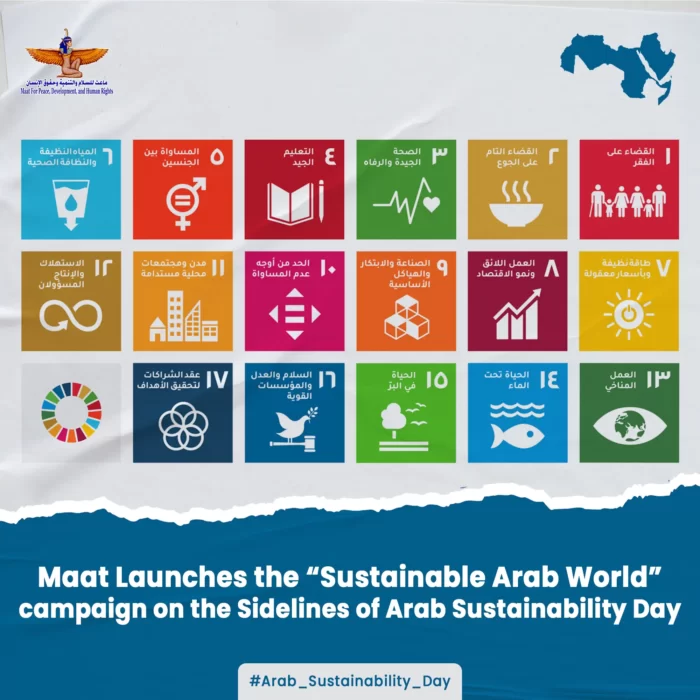 |
Jordan World's Second Water-Poorest Country
Jordan is the world's second water-poorest country. Jordan's annual renewable water resources are less than 100 m3 per person, significantly below the global per capita share of 500 cubic meters, which indicates a severe shortage of water. However, national efforts have succeeded in improving citizens' enjoyment of water; 98% of the population has access to an improved water source, only 93% of them have access to a safely managed source and 86% are connected to water networks.
In urban areas, citizens are supplied with water once a week, and less than once every two weeks in rural areas, with rates dropping during the summer. Only 77.3% of existing sanitation systems are safely managed and only a third of schools have basic sanitation services.
In that framework, Maat for Peace, Development and Human Rights urges the Jordanian government to promote alternative water sources in light of the water poverty that the country suffers from, and the need to develop national plans in order to achieve maximum benefit from alternative water sources.
#Arab_Sustainability _Day
#16_February
#Sustainable_Arab_World
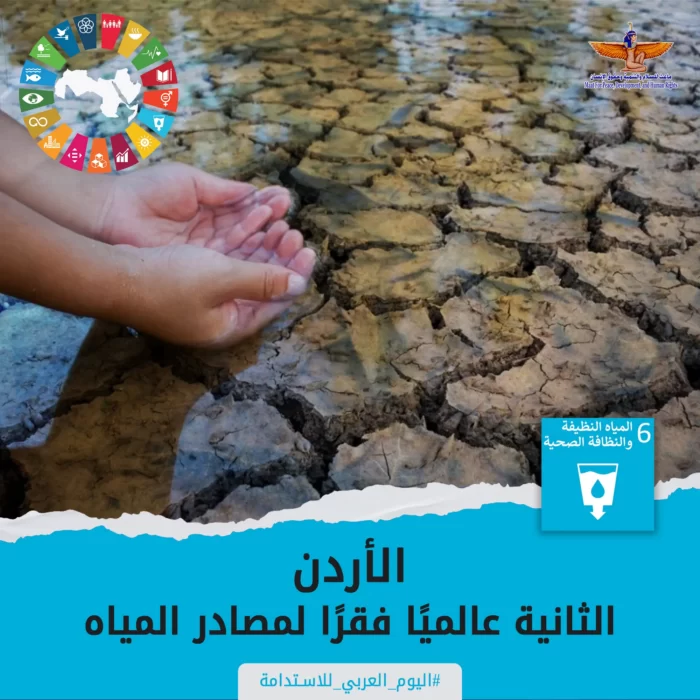 |
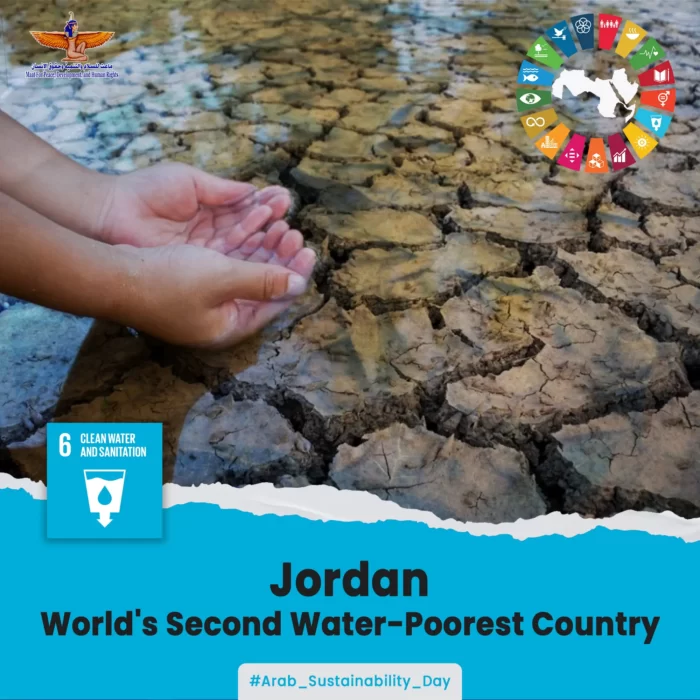 |
Renewable energy sources in Libya... unique advantages that must be exploited
Despite the availability of huge potential for exploiting renewable energy in Libya, it now depends on the production of crude oil, which causes greenhouse gas emissions resulting from its production and refining processes, and leads to ambient air pollution and climate change, which is inconsistent with Goal 7 related to clean energy from Sustainable Development Goals.
One of the most important opportunities available to Libya with regard to renewable energy lies in the fact that Libya is located in the solar belt region, which enjoys the intensity of solar radiation and is considered the highest in the world. Which enjoys wind currents along the Libyan coast, from Tobruk in the east to Tripoli in the west.
Within the framework of the above; Maat refers to the advantages that are unique to Libya with regard to renewable energy sources, and recommends that the Libyan government invite foreign investors to invest in renewable energy in Libya urgently in order to preserve the environment and produce green energy.
#Arab_Sustainability _Day
#16_February
#Sustainable_Arab_World
 |
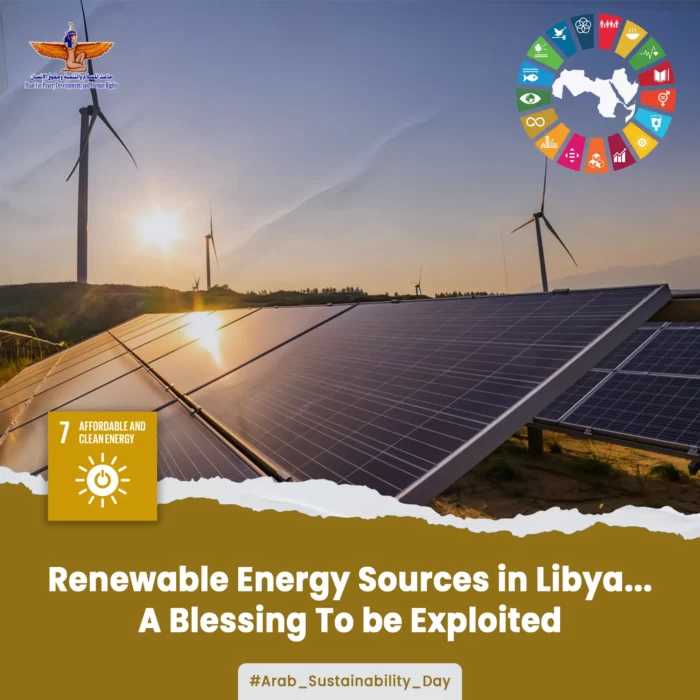 |
The UAE is on the global footsteps in the field of sustainable infrastructure
The UAE government works to ensure sustainable development, protect the environment, and achieve a balance between economic and social development. In terms of infrastructure, the national agenda aspires to become the first country in the world in the quality of infrastructure for airports, ports and roads, in addition to enhancing the quality of providing electricity and communications to become at the forefront of countries in smart services. has developed The National Agenda for the UAE Vision 2021Several indicators to ensure sustainable development.
In fact, the UAE has achieved many global centers in the field of infrastructure, where; It ranked first in the world in the index of mobile Internet subscriptions, the second in the world in the index of ease of access to electricity, and the second in the world in the axis of information and communication technology (ICT) adoption.
in that framework; Maat appreciates the efforts of the UAE government in achieving Goal 9 of the Sustainable Development Goals related to industry, innovation and infrastructure development, and calls on the UAE government to share its successful experience with other Arab countries with regard to infrastructure development within the framework of partnership and cooperation in order to achieve the goals of sustainable development.
#Arab_Sustainability _Day
#16_February
#Sustainable_Arab_World
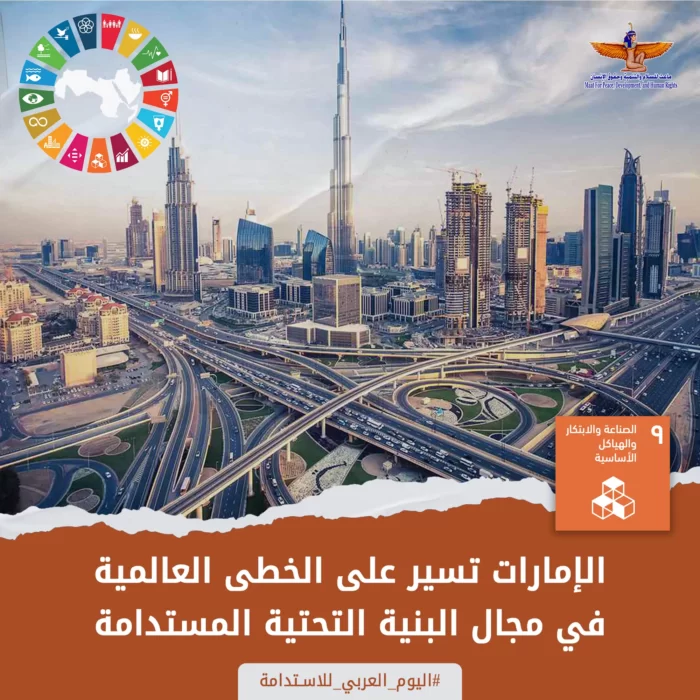 |
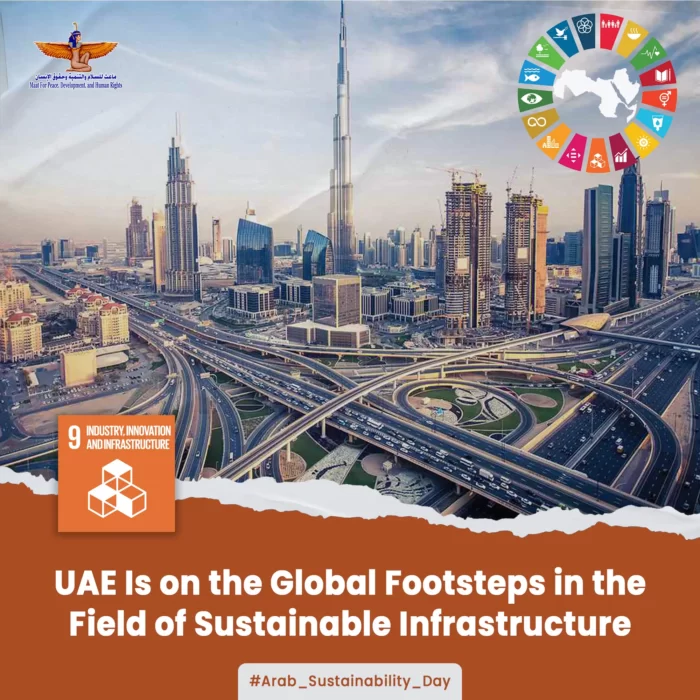 |
“NEOM” .. a sustainable city in the heart of the Arab region
The Kingdom of Saudi Arabia has made a lot of development efforts, especially with regard to building sustainable cities and societies, as it launched and established the sustainable city “NEOM”, which is a smart and sustainable city that works with wind and solar energy, with the provision of water from carbon-free desalination plants that use renewable energy in the desalination process The water is in NEOM, and the brine resulting from the process is used as an industrial raw material, rather than being dumped back into the sea.
The project aims to transform the Kingdom into a leading global model in various aspects of life, by focusing on bringing in value chains in industries and technology within the project. And innovation centers that support the business sector, in addition to developing the targeted economic sectors.
in that framework; Maat Foundation encourages Arab efforts to build sustainable cities to promote the eleventh goal of the development agenda, and calls on Saudi Arabia to support Arab-African countries, whether financially or with expertise and experts, in order to develop their cities in a sustainable and smart way.
#Arab_Sustainability _Day
#16_February
#Sustainable_Arab_World
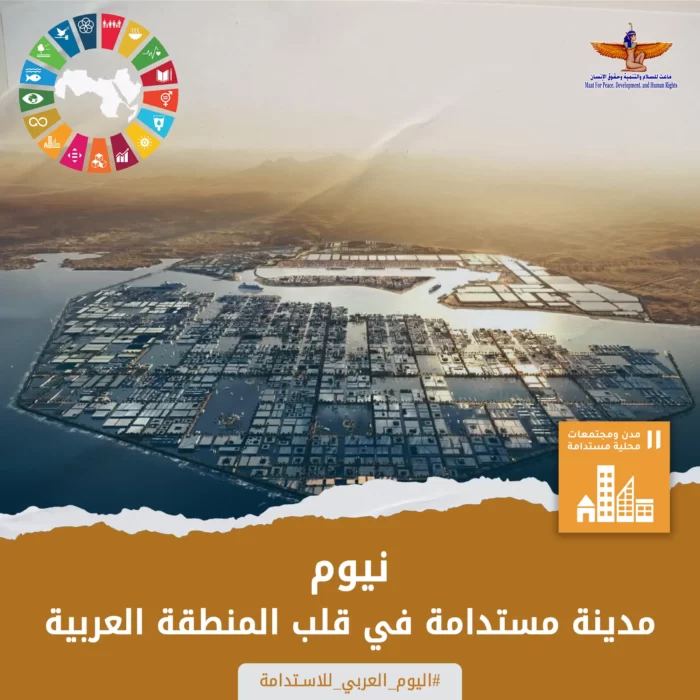 |
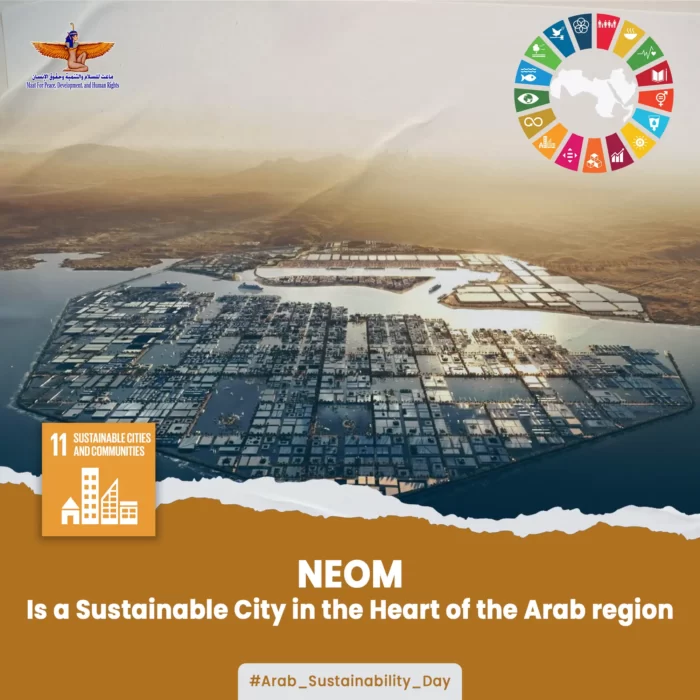 |
Prominent partnerships for achieving sustainable development in the Arab region.. Egypt as a model
The Egyptian government is constantly striving to strengthen its national partnerships in order to achieve all the goals of sustainable development, which is consistent with what was stated in the goals of the seventeenth goal, and within that framework during the year 2022 many partnerships were monitored between the Egyptian government and other governments such as the German, Czech and Moroccan governments Saudi Arabia has also signed many partnerships with the International Labor Organization and the International Organization for Migration.
Within the framework of the projects and initiatives launched by the Egyptian government, it is not possible to overlook the initiatives of a decent life for the Egyptian countryside, the 100 million healthy lives initiative to detect hepatitis C, the Solidarity and Dignity initiative, which is a program that provides conditional cash assistance to poor families, rural women development projects, and the “conscious” initiative. Which seeks to find and support distinguished rural female cadres in Upper Egypt, and other national initiatives launched by the Egyptian government in order to implement Goal 17 of the Sustainable Development Goals.
in that framework; Maat Foundation for Peace, Development and Human Rights stresses the importance of activating the principle of partnerships in order to advance sustainable development in the Arab region. It also calls on the Egyptian government to take more national initiatives, especially those related to vulnerable and marginalized groups, and work to protect them and promote the principle of equal opportunities.
#Arab_Sustainability _Day
#16_February
#Sustainable_Arab_World
 |
 |
The development goals are subject to public review.. Are the Arab countries on the right path?
Through the Maat Foundation’s follow-up to the five development goals in the Arab region, which are the subject of review for the year 2023, and within the framework of the awareness campaign A sustainable Arab homelandWhich I launched on the sidelines of the celebration of the Arab Sustainability Day. Maat noticed that the sixth goal related to access to healthy and clean water is one of the most important goals that must be highlighted in the Arab region, as many Arab countries suffer from water poverty, and many Arab countries do not have many fresh water sources. Also with regard to the seventh goal related to clean energy, Arab countries have many untapped renewable energy sources.
As for the ninth goal related to infrastructureThe Arab countries have made many efforts regarding the development of infrastructure in recent years and have included development plans in the national Arab agendas and programmes, and there is a need to focus on those efforts. With regard to the eleventh goal related to sustainable cities and societies, it should be noted that the Arab countries need more sustainable cities, and that more efforts must be made in order to achieve them. Finally, with regard to the seventeenth goal, there are dozens of partnerships established by Arab countries that have highlighted many challenges that Arab countries must bear in mind in order to overcome and reform them.
#Arab_Sustainability _Day
#16_February
#Sustainable_Arab_World
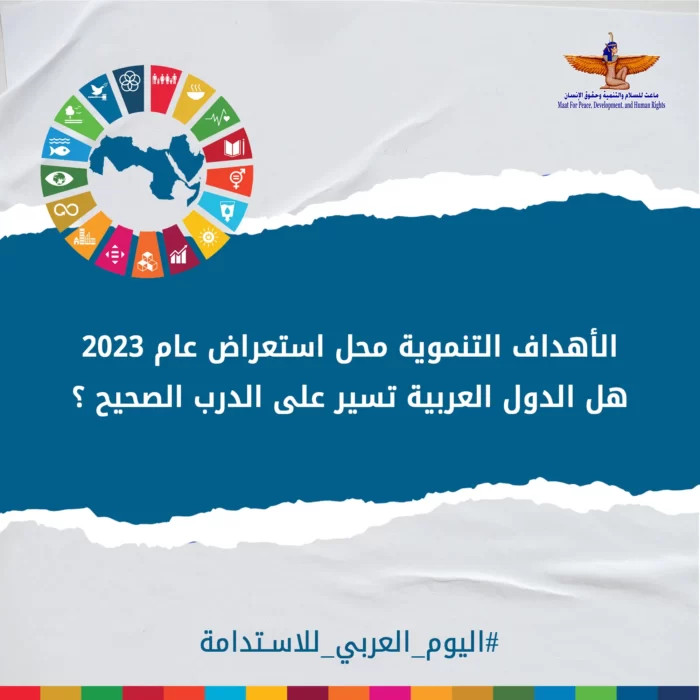 |
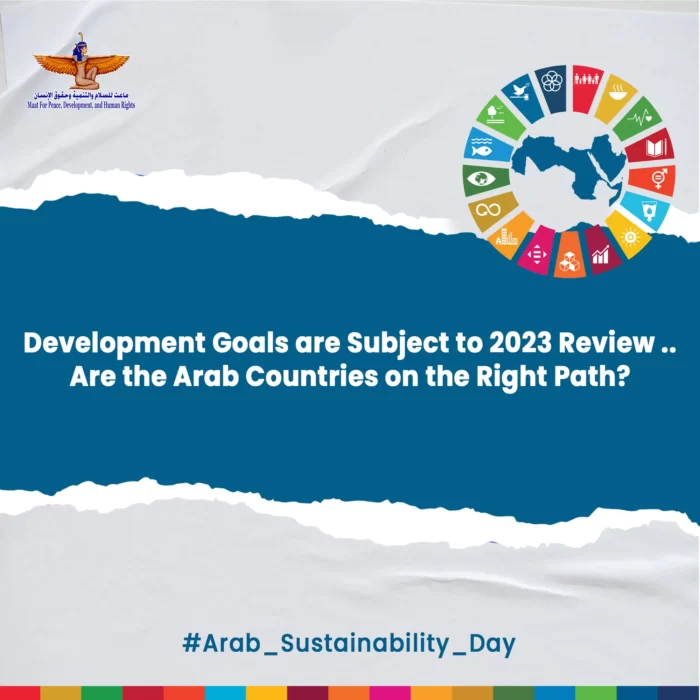 |
shortlink: https://maatpeace.org/en/?p=37801











